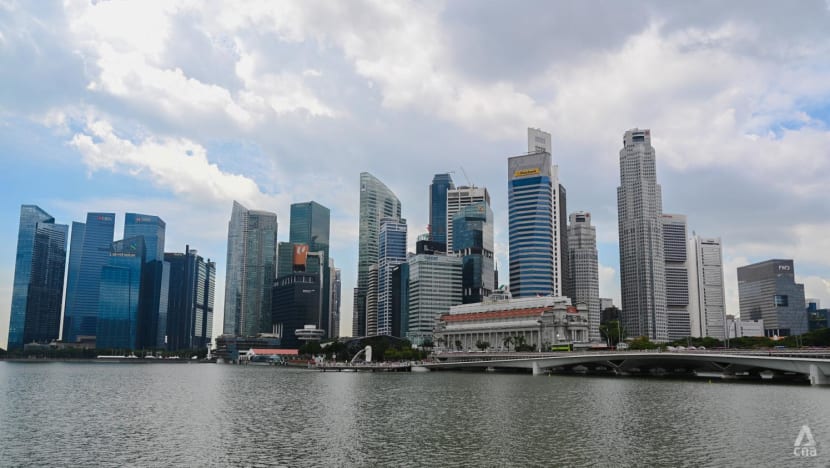Higher investment quantum among changes to scheme that grants PR status to eligible investors
The changes to the Global Investor Programme (GIP) will help to strengthen support for local start-ups and create more jobs, said the Economic Development Board.

Buildings in Singapore's central business district on Nov 16, 2022. (File photo: CNA/Hanidah Amin)
SINGAPORE: Individuals looking to apply for permanent residency (PR) under an investment programme will soon be required to invest much higher amounts in Singapore, as part of changes announced on Thursday (Mar 2) to generate “more spin-offs” for the economy.
Currently, the Global Investor Programme (GIP) grants PR status to eligible foreigners who invest at least S$2.5 million in a new or existing business, a GIP fund that invests in Singapore-based firms, or a new or existing single family office based here with at least S$200 million in assets under management.
With many jurisdictions “competing to attract high-calibre business owners and owners of capital”, the latest changes are aimed at “attracting only top-tier business owners who are interested to drive the growth of their businesses and investments from Singapore”, said the Economic Development Board (EDB) which administers the programme.
“These changes will encourage GIP investors to deploy more funds in the local financial system and generate more jobs for Singaporeans, including in roles such as finance, tax, and legal professionals, as well as fund management,” it added in its press release.
Changes will be made to all three investment options from Mar 15.
INVESTMENT REQUIREMENTS
Applicants looking at the first option of investing in a new or existing business in Singapore will have to demonstrate an investment of at least S$10 million, inclusive of paid-up capital.
For the second option of GIP-select funds, the minimum investment required will go up to S$25 million. These funds will be selected based on a “holistic assessment” of factors such as track record and investment mandate in Singapore, said EDB.
The third option will require applicants to set up a Singapore-based single family office with at least S$200 million in assets under management.
Of which, a minimum of S$50 million must be deployed in any of these four investment categories – companies listed on exchanges licensed by the Monetary Authority of Singapore (MAS), qualifying debt securities and certificates of deposit listed on MAS’ enquiry system, funds distributed by Singapore-licensed managers that are listed on MAS’ financial institutions directory, and private equity injection into non-listed, Singapore-based businesses.
RENEWAL OF RE-ENTRY PERMITS
Changes will also be made to the renewal conditions of these investors’ re-entry permits after the initial five-year period.
Singapore PRs require re-entry permits to travel abroad while retaining their residency status.
Presently, the renewal criteria across the three investment options include hiring a minimum of 10 people with at least half being Singaporeans and ringing up a minimum of S$2 million in business costs.
Under the upcoming changes, those investing in a new or existing business in Singapore will have to hire a minimum of 30 people. Of which, at least half must be Singaporeans and 10 must be new employees.
Those investing in GIP-select funds must maintain their money in these funds.
Lastly, for investors that have set up family offices here, they will need to maintain at least S$50 million in any of the four categories throughout the five years after becoming PRs.
They must also hire five new family office professionals, including at least 3 Singaporeans.
ATTRACT “ONLY TOP-TIER” INVESTORS
The GIP was first introduced in 2004.
The minimum investment sum of S$2.5 million has been in place since January 2011, when it was revised upwards from S$1 million for those putting their money into an approved investment fund or directly in a business in Singapore.
The third option of investing in a new or existing Singapore-based single family office was introduced in March 2020.
The last revision three years ago also added next-generation business owners, founders of fast-growth tech firms and family office principals alongside established business owners as eligible applicants under the programme.
In response to CNA’s queries on whether the stricter requirements might deter investors, EDB said Singapore also has in place other schemes, such as the Overseas Networks & Expertise Pass and Tech.Pass, to attract global talent.
“Amid the complex global operating environment, EDB has seen growing interest in the GIP among business owners who value Singapore’s economic fundamentals and reputation for being stable, reliable and neutral, and are seeking to tap the wide range of business opportunities in the growing Southeast Asian region,” said Mr Matthew Lee, senior vice president of Contact Singapore in EDB.
The latest changes to the GIP are aimed at “anchoring a select group of high-calibre investors” who can make significant economic contributions to key industries in Singapore and “be more rooted to Singapore”.
EDB will continue to review the programme to ensure it “remains relevant and effective”, Mr Lee added.
The GIP has generated more than S$5.46 billion in total business expenditure via direct investments from 2011 to 2022, and created more than 24,000 jobs in Singapore, said Minister of State for Trade and Industry Low Yen Ling in response to a parliamentary question last week.
Between 2020 and 2022, about 200 people have been granted PR status through the GIP, she added.

















